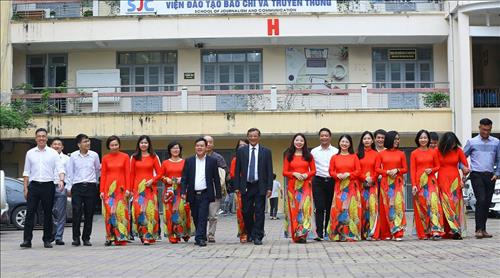
Synthetic Journalism
Since its inception, the Faculty of Journalism has gathered a team of dedicated and enthusiastic staff and lecturers, many of whom are famous and prestigious scientists such as Prof. Ha Minh Duc, Assoc. Prof. Dr. Duong Xuan Son, Assoc. Prof. Dr. Dinh Van Huong, Assoc. Prof. Dr. Do Xuan Ha, Assoc. Prof. Dr. Vu Quang Hao, Assoc. Prof. Dr. Do Quang Hung, Assoc. Prof. Dr. Nguyen Thien Giap, Assoc. Prof. Dr. Doan Huong, Assoc. Prof. Dr. Nguyen Thi Minh Thai, Dr. Trinh Ho Khoa, Mr. Do Chinh, Mr. Tran Quang and many other teachers... That team, both has the profound qualities of a generation of scientists whose reputation and name have been famous in the world of critical theory, both has the gallantry and romantic qualities that have become the brand name of 'Teachers of Synthesis', both has the sharpness, intelligence, and inspiration of masters in using language so that every time the teachers teach, the students listen as if hypnotized, and has the qualities of journalism: quick, thorny, rich in fighting spirit, and critical thinking...
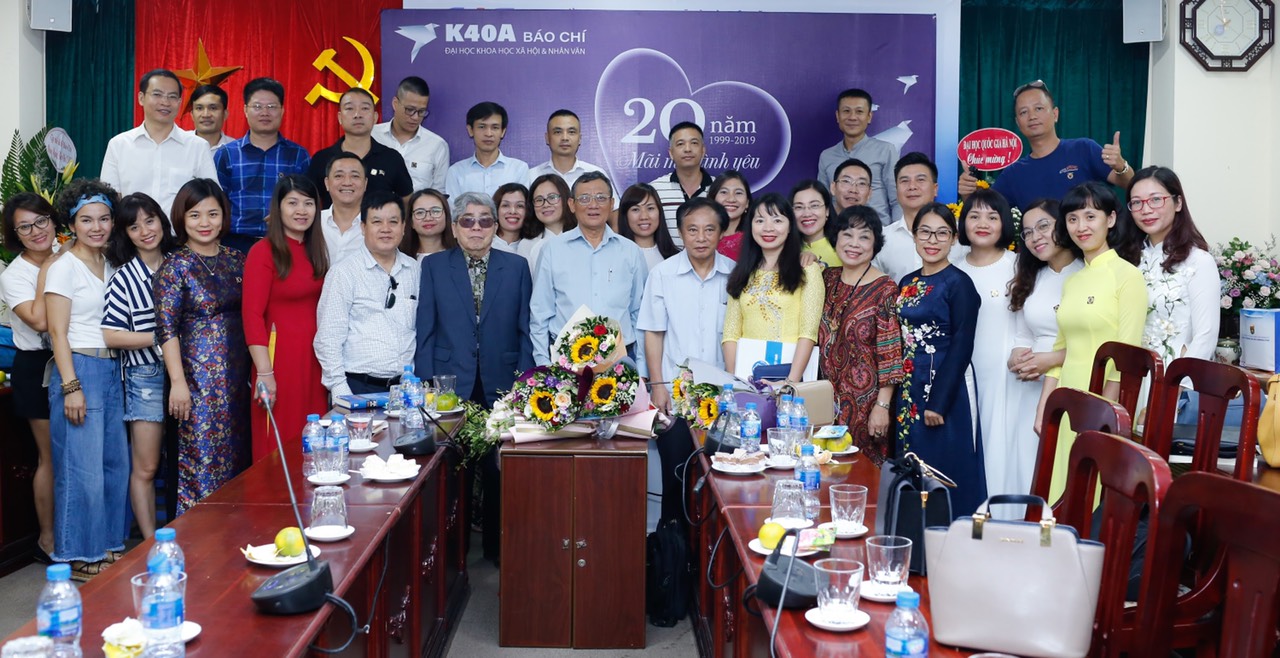
The academic knowledge, professional experience and 'General Journalism' style nurtured by the first teachers who established the Faculty of Journalism laid a solid foundation for the existence and development of the Faculty, helping the Faculty to quickly grow and soon assert its position in the Social Sciences and Humanities sector of VNU. Over the past 30 years, that tradition has always been nurtured and passed on, so that generations of journalists from the General Journalism school always remind themselves of their old school, remind themselves of the cradle that nurtured knowledge, helping them to have more courage to thoroughly identify problems and convey information to the public in the most humane way.
Continuing the career of previous generations, the current teaching staff of the Institute of Journalism and Communication is mostly young, dynamic and enthusiastic, 100% of the lecturers have a master's degree or higher, of which 35% of the Institute's teaching staff are Associate Professors, more than 60% have a PhD. Many staff have received professional training in the Soviet Union, England, Australia, Korea, Russia... and are prestigious experts in the academic and research community of journalism and communication nationwide.
In addition to the regular staff, the Institute of Journalism and Communication also has more than 50 part-time lecturers and invited lecturers who are experts in journalism, journalism management, and many prestigious and experienced journalists, including Associate Professor Dr. Nguyen The Ky, General Director of Voice of Vietnam and Dr. Ta Bich Loan, Head of VTV3 of Vietnam Television, both concurrently hold the position of Head of Departments.
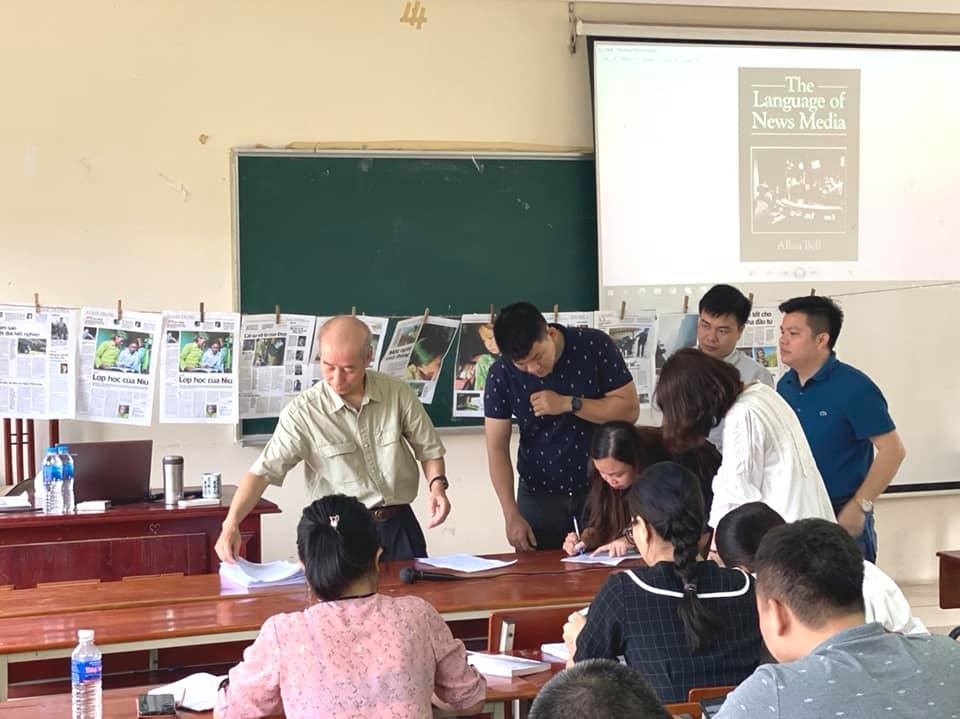
In the leading training and research environment of social sciences and humanities in Vietnam, students of the Institute are exposed to and are imparted with the most basic, fundamental and profound knowledge of social sciences and humanities, important and valuable knowledge foundations that help future journalists write many articles that touch people's hearts with cultural depth and comprehensive social understanding.
The system of equipment invested by the State up to nearly 60 billion VND has helped students and trainees of the Institute to study and work in a basic journalism environment that is synchronous and modern, among the most modern among current journalism and media training institutions. Many students' products have been broadcast and posted on mass media channels, many students of the Institute choose to produce journalism products instead of their university graduation thesis. The gap between training and practice of journalism and media activities is gradually narrowing, theory is being more closely linked with practice when the Training Institute is a miniature newsroom.
From this school, more than 10,000 bachelors, masters, and doctors of journalism have spread to all parts of the country, working and contributing news streams, creating a seamless flow in society. Many alumni are journalists who are always on the front line in difficult times of storms, floods, and natural disasters. Many journalists are leading writers in the fight against corruption and negativity. Hundreds of alumni have received the National Press Award and national press awards from various sectors and levels. Many alumni have held and are holding key positions in the country's press and media system.
Journalism training and research in the context of modern media
In the context of the media explosion, teaching about new media, convergent and multimedia media, social media, the development of modern journalism in the new media environment, etc. is an important content taught at the Institute of Journalism and Communication. In the spirit of continuous innovation, the Institute's training program has been supplemented with many new and modern subjects such asMobile Journalism, Data Journalism, Content Organization and Creation of Journalistic Masterpieces, Reporting in Emergency Situations, and other specialized journalism fields.
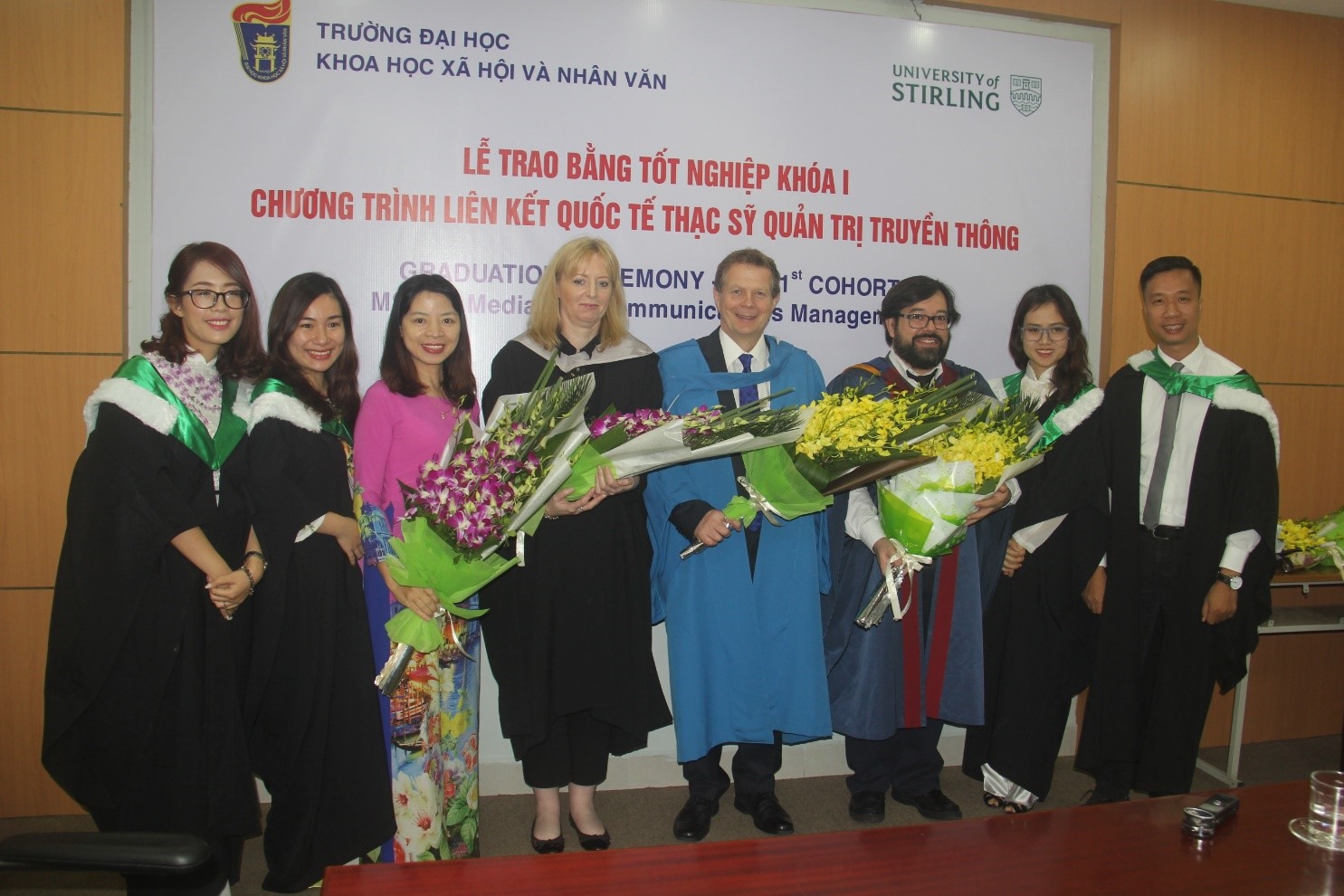
Currently, the Institute of Journalism and Communication has been training throughout the undergraduate, postgraduate and doctoral programs. In addition to the undergraduate programs in Journalism, Journalism (high quality) and Public Relations, the Institute is implementing Master's training in Journalism (research-oriented and application-oriented), Journalism and Communication Management and the joint program in Communication Management (with Stirling University, UK), etc. The number of students enrolled in the Institute's training programs is always in the top 3 of the programs with the largest number of students and trainees registered and for many consecutive years, the Institute of Journalism and Communication has been at the top of the whole school in postgraduate enrollment, of which the Institute has 5 Master's classes in localities across the country.
The Institute's teaching staff has compiled 20 textbooks and 24 specialized lectures, nearly 30 monographs, and translated more than 15 documents on foreign press. Many books have been reprinted many times, effectively serving the study and research of journalism and media in Vietnam. With the above results, the Institute has provided nearly 70% of textbooks, lectures, and specialized documents, in which many textbooks and monographs are not only bedside books for the Institute's lecturers and students, but also handbooks for lecturers and students of many other schools.
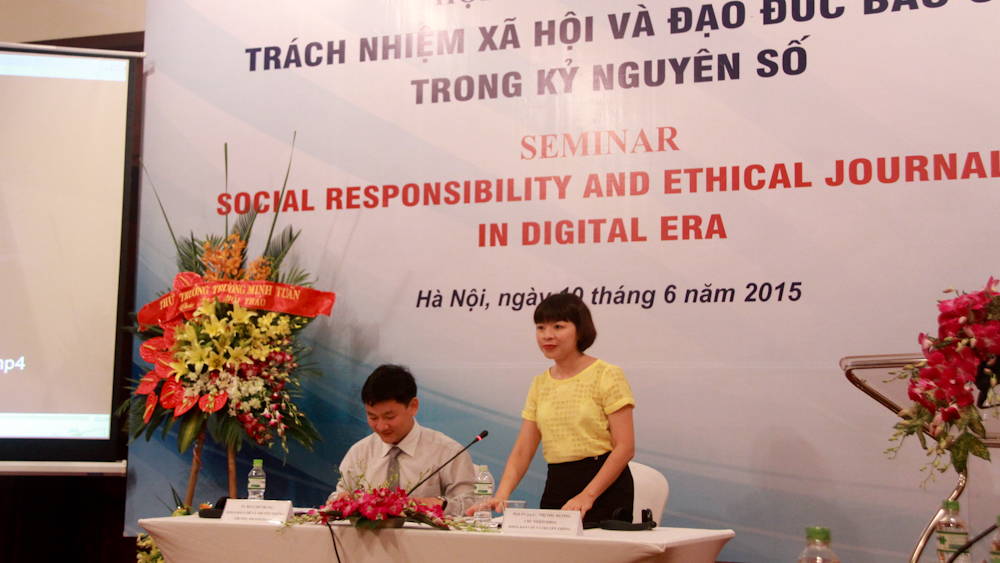
Due to the differences with Western countries in political institutions, socio-economic conditions, local circumstances, historical factors and socio-cultural values - factors considered fundamental to create models, and institutionalize the functions and tasks of different media and press systems around the world, Vietnamese press has a development model and functions and tasks that are completely different from those in Western countries.
After Doi Moi, the Vietnamese press is a media model that combines the immutable principle - 'the press is under the leadership of the Party and the State' - with the principles of a socialist-oriented market economy. From a one-way 'single-function' press, the Vietnamese press has become a 'multi-function' press, not only focusing on propagating the Party's policies, but also being a bridge, a channel for social criticism, creating a seamless flow in society, closely linking information between the Party, the Government and the people; at the same time opening up a direction for the development of the media economy, connecting businesses with the public.
Not only focusing on training, the Institute also identifies in-depth research and refining policy proposals to leadership and management agencies as key tasks.
Over the past 5 years, the Institute's lecturers have implemented and accepted 3 State-level projects, more than 10 projects of Nafosted Fund, Asia Fund, Ministry-level projects, VNU-Hanoi-level projects, and school-level research projects, achieving good and excellent results. The Institute of Journalism and Communication is implementing 01 State-level scientific research project on "Mass media for human rights-based human development" and compile the National Geographic Collection, Communication Collection - a key task, especially at the national level.
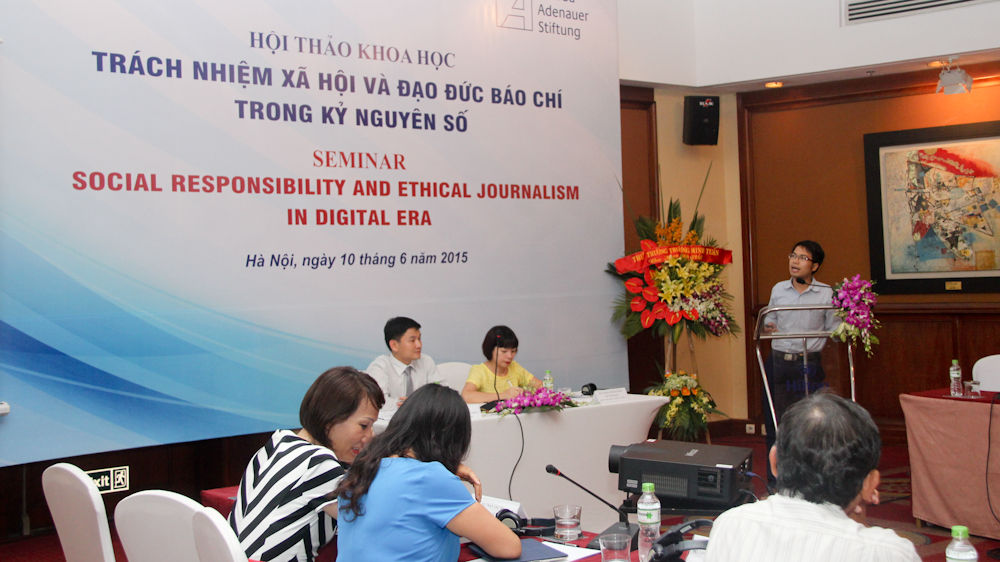
Over the past 5 years, more than 200 scientific articles by lecturers and staff have been published in scientific and theoretical journals, and reported at conferences at home and abroad. 102 high-quality student scientific reports of the Institute have been invested in to compete at the Ministry level, bringing home nearly 30 awards at all levels.
The Institute has organized many domestic and international scientific conferences, attracting the participation of hundreds of Vietnamese and foreign scientists. Many conferences have resonated in the research community, and at the same time, made many contributions to relevant agencies to manage and promote the improvement of the quality of journalism in Vietnam today, such as the conference "Mass media culture in the context of market economy and globalization', “Social Responsibility and Journalism Ethics in the Digital Age”, “Social media, traditional media and public opinion”, 'Media management and information providers in the digital age”, …
Cooperation and development
The Institute is one of the international exchange hubs in journalism and media research and training in Vietnam. Many cooperation projects have been implemented, resulting in the publication of many monographs, dozens of staff members receiving training to improve their qualifications at home and abroad, and the training program framework for Journalism and Public Relations has been gradually revised and improved to suit the development trends of the world and Vietnam's media industry. The Institute has also established a specialized bookshelf in foreign languages with more than 100 books to serve journalism and media training and research.
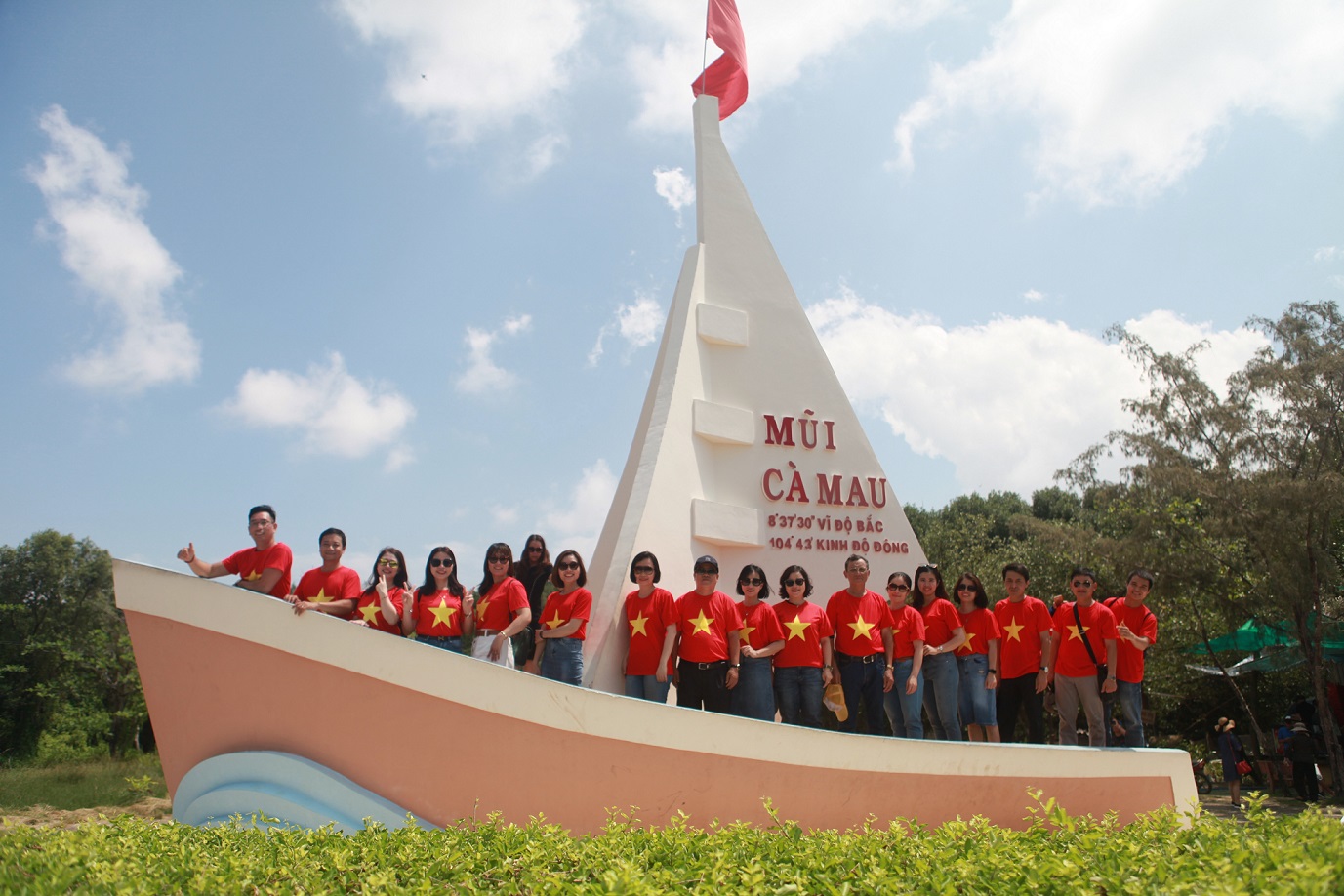
In 2018, on the basis of integrating the Faculty of Journalism and Communication and the Center for Journalism and Communication, the Institute of Journalism and Communication was established, marking a milestone as a pioneer unit in the University of Social Sciences and Humanities, developing from a faculty to an Institute, preparing the premise for university autonomy in the future.
In 2020, celebrating its 30th anniversary, the Institute of Journalism and Communication was honored to receive the Excellent Emulation Flag of the Hanoi National University. The Journalism Department and the Center for Journalism and Communication were honored to receive certificates of merit from the Hanoi National University, and many individuals were awarded certificates of merit from various sectors and levels.
The profound lesson leading to the success of the Institute of Journalism and Communication today is the spirit of solidarity and attachment between generations of teachers and students, the responsibility and dedication of the staff and lecturers, the eagerness to learn and the creative passion of students, trainees, and postgraduates, along with the close coordination and support of press agencies, press management, and domestic and foreign partners. Above all, it is the right orientation, the attention, close guidance, and the great trust that the leaders of VNU, University of Social Sciences and Humanities have given to the teachers and students of the Institute of Journalism and Communication.
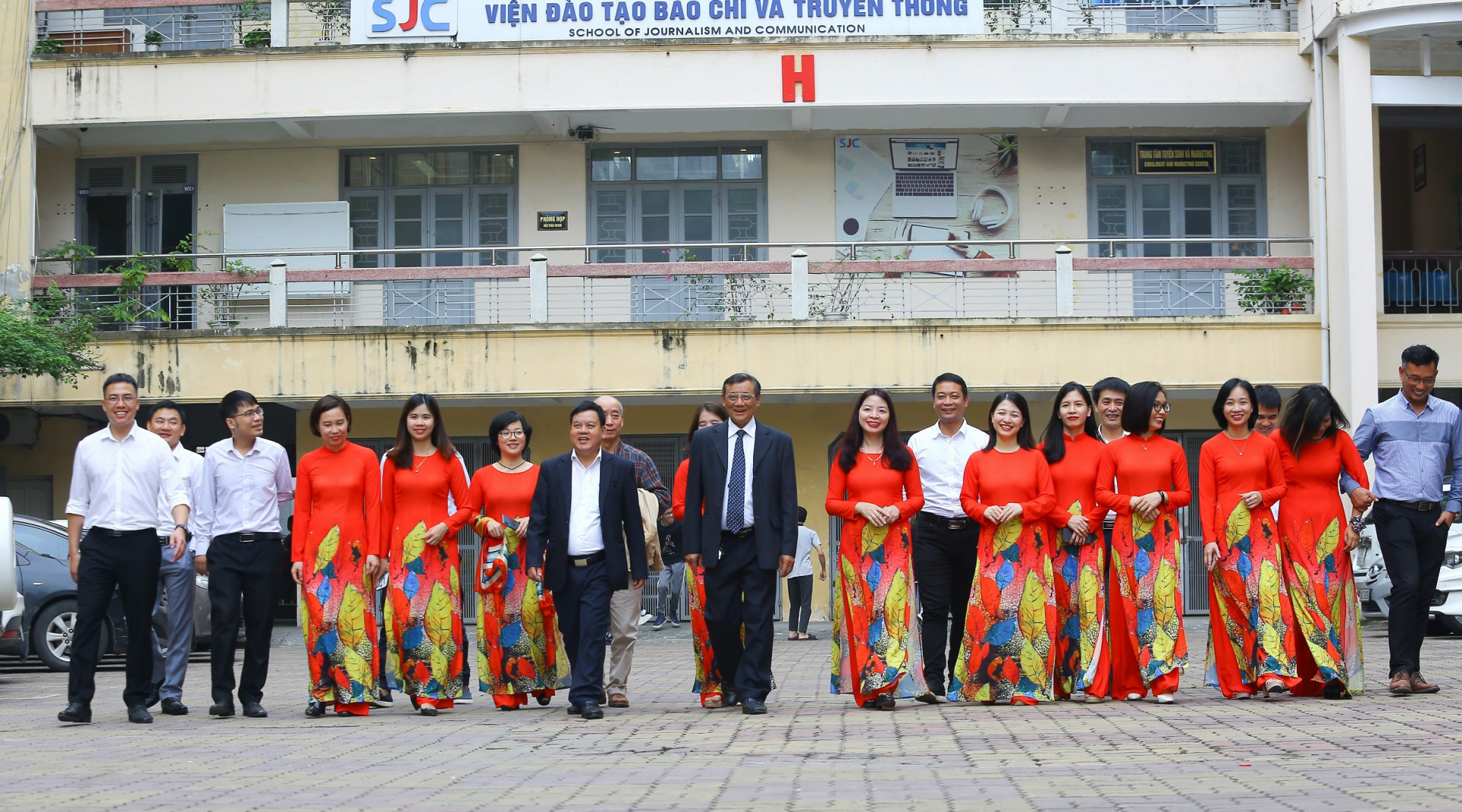
With the youthfulness of 30 years old full of ambition, the teachers and students of the Institute of Journalism and Communication will continue to promote internal strength and collective power, attract domestic and international resources to build and develop the Institute in depth and in the direction of standardization and modernization in the common development of the University of Social Sciences and Humanities and Vietnam National University, Hanoi.
Newer news
Older news